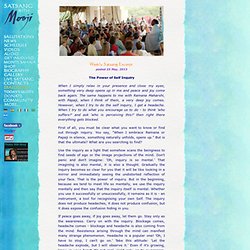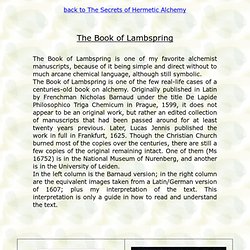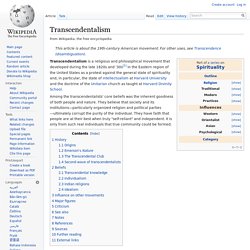

Satsang with mooji - dialogues. Posted 25 May, 2013 The Power of Self Inquiry When I simply relax in your presence and close my eyes, something very deep opens up in me and peace and joy come back again.

The same happens to me with Ramana Maharshi, with Papaji, when I think of them, a very deep joy comes. However, when I try to do the self inquiry, I get a headache. When I try to do what you encourage us to do - to think 'who suffers? ' First of all, you must be clear what you want to know or find out through inquiry. Use the inquiry as a light that somehow scans the beingness to find seeds of ego or the image projections of the mind. If peace goes away, if joy goes away, let them go. Then take the attitude: 'Let me die here, but I will not be blackmailed by my mind.
[Silence] The sense 'I am' is the first born, but awareness is the unborn. Let the actions, reactions and interactions happen, watch them happen. Gradually the mind in the form of 'me the person' merges with the awareness. Nothing... nothing is there... Yes. The Book of Lambspring, text an Interpretation of this Alchemical manuscript. I am called Lambspring, born of a Noble Family, and this Crest I bear with Glory and Justice.

Philosophy I have read, and thoroughly understood, The utmost depth of my teachers' knowledge have I sounded. This God graciously granted to me, Giving me a heart to understand wisdom. Thus I became the Author of this Book, And I have clearly set forth the whole matter, That Rich and Poor might understand. There is nothing like it upon earth; Nor (God be praised) have I therein forgotten my humble self. I am acquainted with the only true foundation: Therefore preserve this Book with care, And take heed that you study it again and again. "Study it again and again": a mere intellectual interpretation is not sufficient, one must gain understanding by contemplating the text and images. The emphasis on directing one's attention to God, or Jesus Christ can be found in several alchemical manuscripts.
The alchemical process is very simple: it is the purification of oneself, nothing else. Transcendentalism. Transcendentalism is a religious and philosophical movement that developed during the late 1820s and '30s[1] in the Eastern region of the United States as a protest against the general state of spirituality and, in particular, the state of intellectualism at Harvard University and the doctrine of the Unitarian church as taught at Harvard Divinity School.

Among the transcendentalists' core beliefs was the inherent goodness of both people and nature. They believe that society and its institutions—particularly organized religion and political parties—ultimately corrupt the purity of the individual. They have faith that people are at their best when truly "self-reliant" and independent. It is only from such real individuals that true community could be formed. History[edit] Origins[edit] Transcendentalism is closely related to Unitarianism, the dominant religious movement in Boston at the early nineteenth century. Emerson's Nature[edit] So shall we come to look at the world with new eyes.